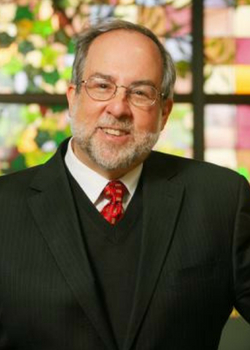Before creating the human being, according to a Midrash, God consulted the angels of heaven. The angel of peace argued, "Don't create him! He will bring war into Your world!" The angel of compassion countered, "He will do kindness, create him!" The angel of justice offered, "Create him! He will do what's right." The angel of truth argued, "He will fill the world with lies, don't create him!" What did God do? God buried truth in the earth and created the Human Being.
There is a fundamental incompatibility between human beings and truth. We don't want truth. We can't tolerate truth -- especially truth about ourselves, our finitude, failures and limitations. We bind ourselves in layers of evasion and self-deception to avoid truth. But once a year, Jewish tradition forces us to unearth the truth and face it. To cut through our culture of evasion, the tradition uses the most powerful psychological solvent available – it confronts us with our death.
Judaism is a passionately life-affirming culture. To protect a human life, any Jewish ritual is suspended. We say "L'Chaim -- To Life!" over every glass of wine. But on the High Holidays, we actually rehearse death. On Yom Kippur, we deny the body -- fasting (which for Jews is certainly a form of death), abstaining from sexual intimacy, removing our jewelry and finery, our fashionable clothes, our polished, comfortable shoes. We don a kittel -- a death shroud. We literally wear what we'll be buried in one day. Why such morbid exercise? To cleanse us. In the face of mortality all the rationalizations, all the excuses, all the defenses fall away, and I am forced to see who and what I really am. The philosopher Franz Rosensweig taught that on Yom Kippur, the Jew is given the unique opportunity to see life through the eyes of eternity. From the vantage of eternity, what in my life matters? What is real? What is important? What is valuable? And what, from eternity's perspective, are all the obsessions and worries that waste my soul and sap my strength? This is the beginning of tshuva, the turning of the Jewish soul.
The Torah reading this week begins with a stunning admonition: Re'eh! See! See the truth! See the emergency of your condition. See what you have become. This is a Shabbat dedicated to vision. On this shabbat we will bless the new month of Ellul, the month of introspection and reflection leading up to the High Holidays.
Re'eh! See: We are one. We share a very small planet. We share a common destiny. But all year, I forget this truth and act as if my success can only be bought with your failure. This attitude, "what's mine is mine and what's yours is yours," is called by the Talmud, "the morality of Sodom" – the path of oblivion, a form of spiritual death. Sin in the world is what cancer is to a body – one cell going its own way without regard to its place in an organic whole. Unchecked, it destroys the whole. Our lives and our fate cannot be separated.
Re'eh! See: Looking squarely into death, I come to realized what I've done. And so I confess aloud: I have sinned. I have squandered the opportunities of this past year. I have misused the gifts and blessings allotted me. I have failed to reach beyond the needs and desires of the self. I reached downward this year, and not upward.
The great Maimonides taught that we ought to regard ourselves as half-sinful and half-righteous. Our next decision determines our fate. There is a balance between the evil and the good within us. It is a paradox: To see the self as completely evil moves us toward moral despair; it closes the door on the possibility of moral growth. We would give up and retreat into our selfishness. To see the self as completely good is to overlook all the brokenness, and deny all the failures of character. So we maintain a dual vision: We can see the real self in all its flaws. And we can also see the ideal self to which we aspire. Most importantly, our fate is yet undetermined. Our character is yet an open question. We are not stuck. Maimonides vigorously resisted any notion of determinism. We are the accumulation of our choices, he taught, and we therefore we stand utterly naked in our responsibility. The first question in the Torah was God's inquiry of the hiding Adam: "Where are you?" And ever since, we have struggled to respond.
A small gloss on Maimoniides is offered by Rabbi Mark Borovitz, the great teacher of tshuvah: Imagine this year that you are 51% evil and 49% good. All we ask is a 2% improvement. Just 2% improvement. Can you find 2% more time to devote to family, to community, to the world? Could you afford to give 2% more to charity? Can you become 2% more considerate, kinder? Can you grow in wisdom, but 2% this year? That's all the holiday asks.
"Teach us to number our days," prays the Psalmist, "to get us a heart of wisdom." Ordinarily a morbid thought. But once a year, confronting the truth of our limited days liberates us from the bondage of illusions and excuses, so that we can see the truth of our existence. Perhaps we can change, and begin this new year with renewed strength, with renewed vision, with renewed hope. We'll see.

